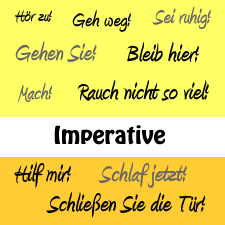The Imperative - Commands

1. There is the simple, direct command in which the verb stem alone is used when addressing one person, or a plural ending is added when addressing more than one.
The Imperative
The imperative verb form is a command or an appeal. It is always directed to the second person singular, "you", wewe or plural ninyi. Swahili has two types of imperative:
2. There is also a polite form of command which is also the subjunctive verb form.
A. Simple imperatives without an object will fall into four groups according to the type of verb stem:
When addressed to only one person, the verb stem alone forms the imperative. When addressed to more than one, a pluralizing suffix NI is added to the verb stem, and the final A changes to E preceding the suffix.
| Sema | Semeni | Speak |
| Amka | Amkeni | Wake up |
| Kaa | Kaeni | Sit, or stay |
| Sikia | Sikieni | Hear |
2. Monosyllabic Bantu verb stems:
These are formed with the infinitive when addressed to one person, and with the change of A to E and addition of NI when addressed to more than one, in the same way as the above group.
| Kula | Kuleni | Eat |
| Kunywa | Kunyweni | Drink |
Since these have no A ending, there is no change in the ending of the verb, only the addition of NI when addressing more than one.
| Jaribu | Jaribuni | Try |
| Furahi | Furahini | Rejoice |
| Hesabu | Hesabuni | Count, calculate |
| Fikiri | Fikirini | Think, ponder |
These three verbs have irregular forms in the simple imperative. The infinitives are given at the left:
| Kuleta | Lete | Leteni | Bring (something) |
| Kuja | Njoo | Njooni | Come |
| Kwenda | Nenda | Nendeni | Go |
B. Simple imperatives with an object will have the final A of Bantu verb stems changed into E. Verbs of non-Bantu origin do not change. The starred forms below must always have an object:
| *Nipe | Nipeni | Give me |
| *Mwambie | Mwambieni | Tell him/her |
| *Waite | Waiteni | Call them |
| Tuonyeshe | Tuonyesheni | Show us |
| Jifunze | Jifunzeni | Learn (teach yourself) |
| Zihesabu | Zihesabuni | Count them (e.g. houses) |
C. The polite form of the imperative is a subjunctive verb form;
this form is examined in detail beginning with paragraph 64.
this form is examined in detail beginning with paragraph 64.
Using the polite imperative has the implication of "Please,
request you to...." An Arabic loanword, tafadhali, please, may
also be added if desired.
request you to...." An Arabic loanword, tafadhali, please, may
also be added if desired.
Components of the construction are:
Subject prefix + Object prefix (optional) + Verb stem
In the case of Bantu verb stems, the final A changes to E. In
verbs of non-Bantu origin, there is no change in the stem. Since
this is an imperative, only two subject prefixes can possibly be
used, either: 2nd person singular u (for wewe) or 2nd person
plural m (for ninyi), see paragraph 20.A.
verbs of non-Bantu origin, there is no change in the stem. Since
this is an imperative, only two subject prefixes can possibly be
used, either: 2nd person singular u (for wewe) or 2nd person
plural m (for ninyi), see paragraph 20.A.
| Useme | Mseme | (Please) speak |
| Uamke | Mwamke | (Please) wake up |
| Ukae | Mkae | (Please) sit, stay |
| Usikie | Msikie | (Please) hear |
| Ule | Mle | (Please) eat |
| Unywe | Mnywe | (Please) drink |
| Ujaribu | Mjaribu | (Please) try |
| Ufurahi | Mfurahi | (Please) rejoice |
| Uhesabu | Mhesabu | (Please) count |
| Ufikiri | Mfikiri | (Please) think |
| Ulete | Mlete | (Please) bring |
| Uje | Mje | (Please) come |
| Uende | Mwende | (Please) go |
| Unipe | Mnipe | (Please) give me |
| Umwambie | Mwambie | (Please) tell him/her |
| Uwaite | Mwaite | (Please) call them |
| Utuonyeshe | Mtuonyeshe | (Please) show us |
| Ujifunze | Mjifunze | (Please) learn |
| Uzihesabu | Mzihesabu | (Please) count them |
D. The negative imperative for both simple imperative and polite imperative is the negative subjunctive form. Its construction is like the positive subjunctive with the addition of a negative particle SI immediately following the subject prefix:
Subject prefix + SI + Object prefix (optional) + verb stem
A few examples from each group in the above list:

| Usiseme | Msiseme | Don't speak |
| Usikae | Msikae | Don't stay/ Don't sit |
| Usile | Msile | Don't eat |
| Usinywe | Msinywe | Don't drink |
| Usijaribu | Msijaribu | Don't try |
| Usihesabu | Msihesabu | Don't count |
| Usilete | Msilete | Don't bring |
| Usije | Msije | Don't come |
| Usiende | Msiende | Don't go |
| Usinipe | Msinipe | Don't give me |
| Usimwambie | Msimwambie | Don't tell him/her |
| Usizihesabu | Msizihesabu | Don't count them |